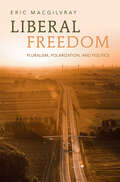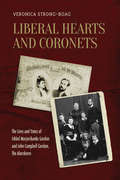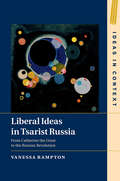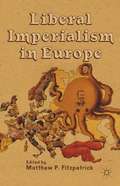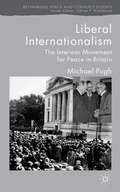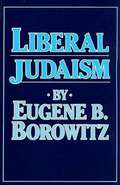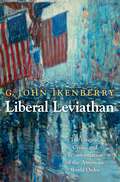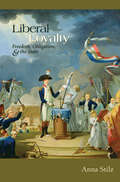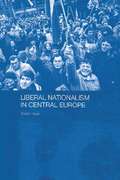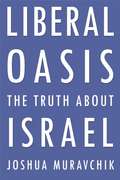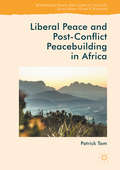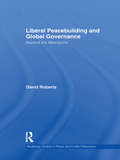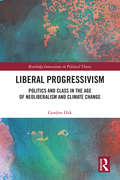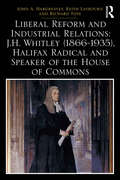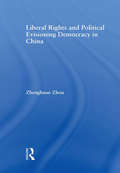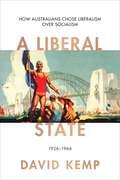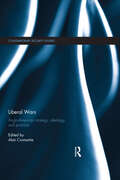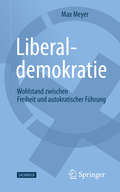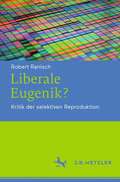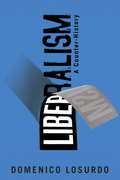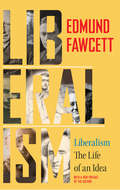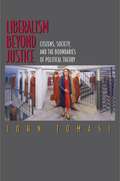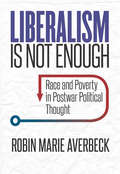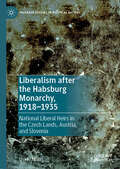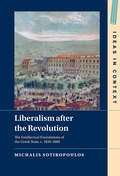- Table View
- List View
Liberal Freedom: Pluralism, Polarization, and Politics
by Eric MacGilvrayWe seem to be losing the ability to talk to each other about – and despite – our political differences. The liberal tradition, with its emphasis on open-mindedness, toleration, and inclusion, is ideally suited to respond to this challenge. Yet liberalism is often seen today as a barrier to constructive dialogue: narrowly focused on individual rights, indifferent to the communal sources of human well-being, and deeply implicated in structures of economic and social domination. This book provides a novel defense of liberalism that weaves together a commitment to republican self-government, an emphasis on the value of unregulated choice, and an appreciation of how hard it is to strike a balance between them. By treating freedom rather than justice as the central liberal value this important book, critical to the times, provides an indispensable resource for constructive dialogue in a time of political polarization.
Liberal Hearts and Coronets
by Veronica Strong-BoagScottish aristocrats John Campbell Gordon (1847-1934) and Ishbel Marjoribanks Gordon (1857-1939), known as the Aberdeens, rejected both revolution and reaction in their political careers. The aristocratic progressivism and egalitarian marriage of these fervent liberals confounded both contemporaries and historians. John, as viceroy of Ireland and governor-general of Canada, was a notable ally of feminists, workers, and Irish Home Rulers. Ishbel, his viceregal companion and the long-time president of the International Council of Women, was a liberal feminist and Home Ruler whose commitments stirred up even more controversy.Superbly written and informed by decades of research, Liberal Hearts and Coronets is the first biography to treat John Campbell Gordon as seriously as his better-known wife. Examining the Aberdeens' remarkable careers as landlords, philanthropists, and international progressives, Veronica Strong-Boag casts the twilight of the British aristocracy in an entirely new light.
Liberal Ideas in Tsarist Russia: From Catherine the Great to the Russian Revolution (Ideas in Context #126)
by Vanessa RamptonLiberalism is a critically important topic in the contemporary world as liberal values and institutions are in retreat in countries where they seemed relatively secure. Lucidly written and accessible, this book offers an important yet neglected Russian aspect to the history of political liberalism. Vanessa Rampton examines Russian engagement with liberal ideas during Russia's long nineteenth century, focusing on the high point of Russian liberalism from 1900 to 1914. It was then that a self-consciously liberal movement took shape, followed by the founding of the country's first liberal (Constitutional-Democratic or Kadet) party in 1905. For a brief, revelatory period, some Russians - an eclectic group of academics, politicians and public figures - drew on liberal ideas of Western origin to articulate a distinctively Russian liberal philosophy, shape their country's political landscape, and were themselves partly responsible for the tragic experience of 1905.
Liberal Imperialism in Europe
by Matthew P. FitzpatrickIn this state-of-the-field anthology, leading scholars in the fields of European imperial history and intellectual history explore the nature of European imperialism during the 'long nineteenth century', scrutinizing the exact relationship between the various forms of liberalism in Europe and the various imperial projects of Europe.
Liberal Internationalism: The Interwar Movement for Peace in Britain (Rethinking Peace and Conflict Studies)
by Michael C. PughThe book investigates the role of popular liberal internationalism as a social movement in Britain using Gramscian and Foucauldian ideas of civil society. It addresses the use of force for peace through an examination of the impact of civil society actors in popular liberal internationalism between the world wars.
Liberal Judaism
by Eugene B. BorowitzAn acute and precise insight into history of the Jewish people from an early Semitic tribe to its place today as a force in America and throughout the world.
Liberal Leviathan: The Origins, Crisis, and Transformation of the American World Order (Princeton Studies in International History and Politics #141)
by G. John IkenberryA new vision for the American world orderIn the second half of the twentieth century, the United States engaged in the most ambitious and far-reaching liberal order building the world had yet seen. This liberal international order has been one of the most successful in history in providing security and prosperity to more people. But in the last decade, the American-led order has been troubled. Some argue that the Bush administration, with its war on terror, invasion of Iraq, and unilateral orientation, undermined this liberal order. Others argue that we are witnessing the end of the American era. Liberal Leviathan engages these debates.G. John Ikenberry argues that the crisis that besets the American-led order is a crisis of authority. A political struggle has been ignited over the distribution of roles, rights, and authority within the liberal international order. But the deeper logic of liberal order remains alive and well. The forces that have triggered this crisis—the rise of non-Western states such as China, contested norms of sovereignty, and the deepening of economic and security interdependence—have resulted from the successful functioning and expansion of the postwar liberal order, not its breakdown. The liberal international order has encountered crises in the past and evolved as a result. It will do so again.Ikenberry provides the most systematic statement yet about the theory and practice of the liberal international order, and a forceful message for policymakers, scholars, and general readers about why America must renegotiate its relationship with the rest of the world and pursue a more enlightened strategy—that of the liberal leviathan.
Liberal Loyalty: Freedom, Obligation, and the State
by Anna StilzMany political theorists today deny that citizenship can be defended on liberal grounds alone. Cosmopolitans claim that loyalty to a particular state is incompatible with universal liberal principles, which hold that we have equal duties of justice to persons everywhere, while nationalist theorists justify civic obligations only by reaching beyond liberal principles and invoking the importance of national culture. In Liberal Loyalty, Anna Stilz challenges both views by defending a distinctively liberal understanding of citizenship. Drawing on Kant, Rousseau, and Habermas, Stilz argues that we owe civic obligations to the state if it is sufficiently just, and that constitutionally enshrined principles of justice in themselves--rather than territory, common language, or shared culture--are grounds for obedience to our particular state and for democratic solidarity with our fellow citizens. She demonstrates that specifying what freedom and equality mean among a particular people requires their democratic participation together as a group. Justice, therefore, depends on the authority of the democratic state because there is no way equal freedom can be defined or guaranteed without it. Yet, as Stilz shows, this does not mean that each of us should entertain some vague loyalty to democracy in general. Citizens are politically obligated to their own state and to each other, because within their particular democracy they define and ultimately guarantee their own civil rights. Liberal Loyalty is a persuasive defense of citizenship on purely liberal grounds.
Liberal Nationalism in Central Europe
by Stefan AuerAfter the collapse of communism there was a widespread fear that nationalism would pose a serious threat to the development of liberal democracy in the countries of central Europe. This book examines the role of nationalism in post-communist development in central Europe, focusing in particular on Poland, the Czech Republic and Slovakia. It argues that a certain type of nationalism, that is liberal nationalism, has positively influenced the process of postcommunist transition towards the emerging liberal democratic order.
Liberal Oasis: The Truth About Israel
by Joshua MuravchikIsrael has become the most reviled of states; and the international Left-world church bodies, British labor unions, American human rights groups and the like-has been especially vociferous in its condemnations. <P><P>But, ironically, Israel's humane accomplishments in the very realms that the Left most cherishes compare favorably with those of most other countries. This is especially true if Israel is compared with other countries in its region, or with other countries under external duress, or with the other states born after World War Two that have so often stumbled at nation-building. In Liberal Oasis: The Truth About Israel, Joshua Muravchik marshals a wealth of hard data, livened with telling anecdotes, to show that in the achievement of liberty, equality, fraternity, Israel is one of the world's most remarkable and admirable societies.
Liberal Peace and Post-Conflict Peacebuilding in Africa
by Patrick TomThe book makes theoretical and empirical contributions to recent debates on hybrid forms of peace and 'post-liberal' peace. In applying concepts of power, hybridity and resistance, and providing different kinds of hybridity and resistance to explore post-conflict peacebuilding in Sierra Leone, the author makes an original contribution to existing literature by providing various ways in which power can be exercised not just between locals and internationals, but also among locals themselves and the nature of peace that is produced. This volume provides various ways in which hybridity and resistance can be manifested. A more rigorous development of these concepts not only offers a better understanding of the nature of these concepts, but also helps us to distinguish forms of hybridity and resistance that are emancipatory or transformatory from those that result in people accommodating themselves to their situation. This book is an invaluable resource for scholars and students of peacebuilding, peace and conflict studies, International Relations and African Studies, and practitioners of peacebuilding and post-conflict reconstruction.
Liberal Peacebuilding and Global Governance: Beyond the Metropolis (Routledge Studies in Peace and Conflict Resolution)
by David RobertsThis book examines the limits to cosmopolitan liberal peacebuilding caused by its preoccupation with the values and assumptions of neoliberal global governance. The peace people experience is determined by the processes privileged in peacebuilding. This book is about four things that shape the processes involved. First, it is a critique of orthodox postconflict peacebuilding. It takes the position that the present approach, although seemingly hegemonic, is routinely ignored or manipulated by elites and society and converted into a miasma that to some degree wastes the energies and opportunities involved. Second, it is about alternatives which invoke the kind of peace people might seek in postconflict places if they had more control over the process of peacebuilding, a notion referred to here as ‘popular peace’. It is thus not the kind of critical work that some describe as ‘reflexive anti-liberalism’. Rather, it seeks alternatives that are grounded in the lives of people in postconflict spaces and which also reflect some of the essential values of Liberalism. Third, it is about the role of both informal and formal actors, institutions and practices in the creation of such a peace. For instance, it is concerned with the legitimacy of informal practices that lie beyond Liberal tolerance and which are vital in the pursuit of everyday peace. Fourth, it is about a ‘transversal’ (rather than vertical or hierarchical) relationship of global and local governance in securing a peace that reflects the needs and values of both. In short, this work is a response to the substantial inconsistencies that appear between peacebuilding rhetoric and everyday outcomes in postconflict places. This book will be of much interest to students of peacebuilding, post-conflict statebuilding, conflict studies, global governance and International Relations in general.
Liberal Progressivism: Politics and Class in the Age of Neoliberalism and Climate Change (Routledge Innovations in Political Theory)
by Gordon HakIn Liberal Progressivism, Gordon Hak makes the case for the value of theory and philosophy in understanding the day-to-day political realm of elections, politicians, scandals, fund-raising, and law-making. Running through the book is the big question of how political attitudes and actions are philosophically grounded: why do people believe what they do? Framed as a debate between liberal progressivism and the Marxist-informed left, and between liberal progressives and the non-university-educated working class, an informant named "Gord" is introduced. Drawing on his life experience he acts as a guide into the worlds of liberal progressivism, the non-university-educated working class, and the Marxist-informed intellectual-left modes of existence that he has personally experienced. In 11 chapters, the book presents an appreciation of nonbinary relationships, open-ended dialectics, complex systems and equilibrium theory, and the importance of emotions in political life. Through a transdisciplinary approach, the book delves into the interconnecting the worlds of politics, philosophy, anthropology, sociology, history, and epistemology to produce a celebration of political theory which deserves to be widely read by students, scholars and activists.
Liberal Reform and Industrial Relations: J. H. Whitley (1866-1935), Halifax Radical And Speaker Of The House Of Commons (Routledge Studies in Modern British History)
by Keith Laybourn Richard Toye John A. HargreavesJ.H. Whitley came from an established business family in Halifax, where he engaged in youth work and municipal politics before becoming MP for Halifax from 1900 to 1928. He was a Liberal Radical who worked with Labour, gave his name to the industrial councils of the First World War, was Speaker of the House of Commons 1921-28 presiding over the debates at the time of the General Strike of 1926. In 1929-31 he toured India as chairman of the Royal Commission on Indian Labour and was chairman of the BBC between 1930 and 1935. He was thus a vitally important political figure who was active at the rise of Labour and the decline of Liberalism, involved in the Liberal reforms of the Edwardian age, and deeply concerned about industrial relations in early twentieth century Britain and beyond. This volume brings together leading academics and provides new information and analysis on the life, work and times of J.H. Whitley, offering a study of his career in British politics and society, focusing particularly on the last decade of the nineteenth century and the first three decades of the twentieth century.
Liberal Rights and Political Culture: Envisioning Democracy in China (East Asia: History, Politics, Sociology and Culture)
by Zhenghuan ZhouThis book argues that the liberal concept of rights presupposes and is grounded in an individualistic culture or shared way of relating, and that this particular shared way of relating emerged only in the wake of the Reformation in the modern West.
Liberal State: How Australians Chose Liberalism over Socialism 1926–1966
by David KempA Liberal State: How Australians Chose Liberalism over Socialism 1926-1966 explores the revival of Australian political liberalism after the Great Depression of the 1930s and its sweeping domestic political triumph after World War II over utopian socialism. The fourth title in a landmark five-volume Australian Liberalism series, A Liberal State examines how Australians reasserted their claim to control their own lives, following decades of expanded government control over economic and social life, and intrusive wartime and post-war restrictions. From the 1920s Robert Menzies became the major voice for liberal thought in the nation's political life and David Kemp looks at his role in reconstructing liberal and conservative politics. The book highlights the importance of the factional struggles within the Labor Party arising from its adoption of a Socialist Objective, and the domestic and international advance of utopian socialist ideology during World War II and the Cold War. A Liberal State tells of Jack Lang's advocacy of the socialisation of industry in New South Wales in the 1930s, and of Menzies as war-time prime minister and his key relationship with John Curtin. It assesses Menzies's historic Forgotten People statement of liberal ideas, the formation of the Liberal Party of Australia, and how, after his election victory in 1949, Menzies rebuilt a liberal basis for national policy during sixteen and a half years as prime minister.
Liberal Wars: Anglo-American Strategy, Ideology and Practice (Contemporary Security Studies)
by Alan CromartieThis book addresses the relationship between the 'liberal' values of Anglo-Saxon cultures and the way that they conduct themselves when they are fighting - or preparing to fight - wars. The United States and the United Kingdom are characterised by a consensus that their social and political arrangements are, in a very broad sense, ‘liberal’. Liberalism is not pacifism; nor are liberals necessarily respectful of traditional prohibitions that have set out to moderate excessive violence. But liberals do seek to understand their violent actions as part of a wider project of defending or expanding liberal freedoms. The perceived alternative is to undermine the will to keep on fighting. Sustaining a liberal picture of what is going on is an indispensable part of a liberal strategy. Contributors with disciplinary backgrounds in history, international relations, and strategic studies discuss what ‘liberalism’ means in this particular context and how it might relate to ‘strategy’, both in the recent past and in the future. The chapters consider how liberal states understand the wars they fight, the constraints liberal values place on these states, the role of public opinion and the appropriate strategies for modern liberal states. Topics addressed include civilian bombing, the nature of US military culture, the British ‘Iraq inquiries’, the effects of the erosion of Westphalian sovereignty and the rise of new ideas about ‘globalization’, and the decline in popular involvement. This book will be of much interest to students of strategic studies, political philosophy, foreign policy, security studies and IR in general.
Liberaldemokratie: Wohlstand zwischen Freiheit und autokratischer Führung
by Max MeyerNoch nie ging es so vielen Menschen so gut. Wohlstand ist aber kein Naturgesetz, er muss erarbeitet werden. Dieses Buch will aufzeigen, welche Faktoren für den Aufstieg erfolgreicher Länder entscheidend waren. Im Vordergrund steht dabei eine liberale Wirtschaft – nicht als politisches System, sondern in Form wirtschaftlicher Spielregeln. Die Spielregeln des freien Marktes stehen politisch weder rechts noch links, denn Liberalismus und Sozialstaat sind keine Gegensätze. Das Fundament nachhaltiger Prosperität bilden Freiheit, Chancengleichheit und ein funktionierender Staat. Bedingung dafür ist eine stabile Demokratie, die nicht von einem Autokraten infrage gestellt werden kann. Zwar können erste Schritte aus der Armut autokratisch effizient erfolgen. Sobald jedoch ein gewisser Wohlstand erreicht ist, verlangen die Menschen nach Wohlbefinden – also nach Freiheit und Mitbestimmung. Nur so treiben sie die Entwicklung weiter voran. Die Beachtung der Menschenrechte ist daher entscheidend. Mit über 40 Jahren Erfahrung als Anwalt, Unternehmer und Verwaltungsrat schildert der Autor dieses Buches in klaren Worten, unter welchen Voraussetzungen der Wohlstand eines Landes nachhaltig gesichert werden kann.
Liberale Eugenik?: Kritik der selektiven Reproduktion
by Robert RanischAnwendungen der Gendiagnostik und Reproduktionsmedizin erlauben es Wunscheltern, immer weiter auf das Erbgut ihrer Nachkommen Einfluss zu nehmen. Eine solche „liberale Eugenik“ wird mittlerweile auch in der Philosophie und Bioethik befürwortet. Wo liegen aber die Ursprünge eines solchen Denkens und wie ist eine umfassende Fortpflanzungsfreiheit zu bewerten? Ausgehend von einer freiheitlichen Ethik leistet die Studie eine immanente Kritik an der liberalen Eugenik und entwirft dabei eine eigene Position zum Umgang mit neuen gentechnischen Möglichkeiten.
Liberalism
by Gregory Elliott Domenico LosurdoIn this definitive historical investigation, Italian author and philosopher Domenico Losurdo argues that from the outset liberalism, as a philosophical position and ideology, has been bound up with the most illiberal of policies: slavery, colonialism, genocide, racism and snobbery.Narrating an intellectual history running from the eighteenth through to the twentieth centuries, Losurdo examines the thought of preeminent liberal writers such as Locke, Burke, Tocqueville, Constant, Bentham, and Sieyès, revealing the inner contradictions of an intellectual position that has exercised a formative influence on today's politics. Among the dominant strains of liberalism, he discerns the counter-currents of more radical positions, lost in the constitution of the modern world order.
Liberalism
by Edmund FawcettLiberalism dominates today's politics just as it decisively shaped the past two hundred years of American and European history. Yet there is striking disagreement about what liberalism really means and how it arose. In this engrossing history of liberalism--the first in English for many decades--veteran political observer Edmund Fawcett traces the ideals, successes, and failures of this central political tradition through the lives and ideas of a rich cast of European and American thinkers and politicians, from the early nineteenth century to today.Using a broad idea of liberalism, the book discusses celebrated thinkers from Constant and Mill to Berlin, Hayek, and Rawls, as well as more neglected figures. Its twentieth-century politicians include Franklin D. Roosevelt, Lyndon Johnson, and Willy Brandt, but also Hoover, Reagan, and Kohl. The story tracks political liberalism from its beginnings in the 1830s to its long, grudging compromise with democracy, through a golden age after 1945 to the present mood of challenge and doubt.Focusing on the United States, Britain, France, and Germany, the book traces how the distinct traditions of these countries converged on the practice of liberal democracy. Although liberalism has many currents, Fawcett suggests that they are held together by shared commitments: resistance to power, faith in social progress, respect for people's chosen enterprises and beliefs, and acceptance that interests and faiths will always conflict.An enlightening account of a vulnerable but critically important political creed, Liberalism will be a revelation for readers who think they already know--for good or ill--what liberalism is.
Liberalism Beyond Justice: Citizens, Society, and the Boundaries of Political Theory
by John TomasiLiberal regimes shape the ethical outlooks of their citizens, relentlessly influencing their most personal commitments over time. On such issues as abortion, homosexuality, and women's rights, many religious Americans feel pulled between their personal beliefs and their need, as good citizens, to support individual rights. These circumstances, argues John Tomasi, raise new and pressing questions: Is liberalism as successful as it hopes in avoiding the imposition of a single ethical doctrine on all of society? If liberals cannot prevent the spillover of public values into nonpublic domains, how accommodating of diversity can a liberal regime actually be? To what degree can a liberal society be a home even to the people whose viewpoints it was formally designed to include? To meet these questions, Tomasi argues, the boundaries of political liberal theorizing must be redrawn. Political liberalism involves more than an account of justified state coercion and the norms of democratic deliberation. Political liberalism also implies a distinctive account of nonpublic social life, one in which successful human lives must be built across the interface of personal and public values. Tomasi proposes a theory of liberal nonpublic life. To live up to their own deepest commitments to toleration and mutual respect, liberals, he insists, must now rethink their conceptions of social justice, civic education, and citizenship itself. The result is a fresh look at liberal theory and what it means for a liberal society to function well.
Liberalism Is Not Enough: Race and Poverty in Postwar Political Thought
by Robin Marie AverbeckIn this intellectual history of the fraught relationship between race and poverty in the 1960s, Robin Marie Averbeck offers a sustained critique of the fundamental assumptions that structured liberal thought and action in postwar America. Focusing on the figures associated with "Great Society liberalism" like Daniel Patrick Moynihan, David Riesman, and Arthur Schlesinger Jr., Averbeck argues that these thinkers helped construct policies that never truly attempted a serious attack on the sources of racial inequality and injustice.In Averbeck's telling, the Great Society's most notable achievements--the Civil Rights Act and the Voting Rights Act--came only after unrelenting and unprecedented organizing by black Americans made changing the inequitable status quo politically necessary. And even so, the discourse about poverty created by liberals had inherently conservative qualities. As Liberalism Is Not Enough reveals, liberalism's historical relationship with capitalism shaped both the initial content of liberal scholarship on poverty and its ultimate usefulness to a resurgent conservative movement.
Liberalism after the Habsburg Monarchy, 1918–1935: National Liberal Heirs in the Czech Lands, Austria, and Slovenia (Palgrave Studies in Political History)
by Oskar MulejThis book explores what it meant to be ‘liberal ’ in interwar Czech, Austrian, and Slovenian politics. Up until 1918, these countries shared the common political framework of Cisleithania (the Austrian part of the Habsburg Monarchy). Within this framework was the predominantly pejorative function of the label ‘liberal,’ and as a result after 1918, no major political party employed it to describe its own political orientation. Despite making considerable efforts to dissociate themselves from liberalism, many parties continued to be referred to as ‘liberal ’ by the contemporary public. This association with liberalism, the book argues, was primarily due to the parties’ historical background rather than any ideological commitment to liberalism, and for that reason, the author refers to them as ‘national liberal heirs.’ Examining the (dis)continuities of liberal party traditions, the book presents three representative cases of national liberal heirs: the Czechoslovak National Democracy; the Greater German People’s Party; and the Slovenian sections of the Yugoslav Democratic Party, the Independent Democratic Party, and the Yugoslav National Party. Forming a distinctive part of early twentieth-century party landscapes in Central Europe, the national liberal heirs had inherited organisational structures, parts of electorate, as well as rootedness in specific cultural and social milieus from their liberal predecessors. Following the political trajectories of the national liberal heirs, the author seeks to answer in which spheres, in which manners, and to what extent liberalism survived or even continued to develop in the interwar Czech lands, Austria, and Slovenia.
Liberalism after the Revolution: The Intellectual Foundations of the Greek State, c. 1830–1880 (Ideas in Context #143)
by Michalis SotiropoulosHow is a new state built? To what ideas, concepts and practices do authorities turn to produce and legitimise its legal and political system? And what if the state emerged through revolution, and sought to obliterate the legacy of the empire which preceded it? This book addresses these questions by looking at nineteenth-century Greek liberalism and the ways in which it engaged in reforms in the Greek state after independence from the Ottomans (c. 1830-1880). Liberalism after the Revolution offers an original perspective on this dynamic period in European history, and challenges the assumptions of Western-centric histories of nineteenth-century liberalism, and its relationship with the state. Michalis Sotiropoulos shows that, in this European periphery, liberals did not just transform liberalism into a practical mode of statecraft, they preserved liberalism's radical edge at a time when it was losing its appeal elsewhere in Europe.
